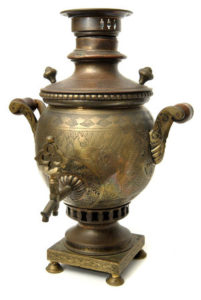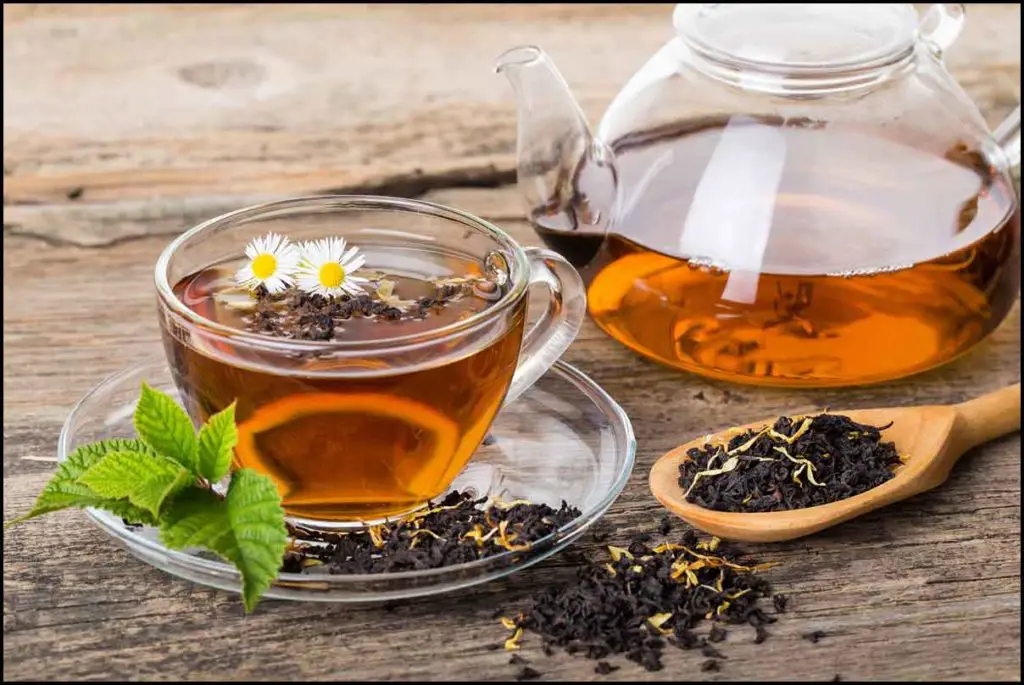What is Persian Tea?
Persian Tea is a beverage made from black tea leaves steeped in hot water. The flavor is often supplemented with rose water and aromatic spices. It is a popular drink among residents of Iran and those of Iranian descent. Often referred to as “chai”, it is generally not the chai tea familiar to most North Americans (when Americans refer to “chai”, they typically mean masala chai). This misleading term comes from the fact that the term “chai” is used to refer to tea in many countries across Asia. It originates from the Persian word “chay” which, in turn, is derived from the word “cha” from China.
Historically, tea was used for its medicinal benefits rather than as a beverage throughout Asia. Before the fifteenth century, coffee was the favored drink in Western Asia, where coffee houses known as ghahveh khaneh were established as roadside locations for travelers who wished to rest. However, despite keeping the name and general style, tea took over as the beverage of choice at these businesses, as the presence of the British empire became more prominent in the area. This became especially true in the first half of the nineteenth century. At this time, the East India Company developed an economy for tea in central Asia to fill the demand that was not being matched by the Chinese market. The benefits of Persian Tea have gained worldwide popularity over the last few decades.
Today, Persian Tea exists in several different formulations based on the needs and personal tastes of the drinker. At its most basic, it is made from the steeped leaves of Assam, which is a black tea noted for its strength. Other ingredients added for taste and fullness can be milk, black pepper, ginger, fennel, cinnamon and various types of sweeteners.
Persian Tea Benefits
As previously stated, the initial purpose of Persian tea was for medicinal applications before it became a beverage of leisure. The benefits are as follows:
Antioxidant/Cancer Prevention
Persian Tea has been shown to minimize damage to the tissues and cells of the drinker via both the tea itself and the spices often added to the beverage (ginger and cardamom, in particular). According to experts at Indiana University School of Medicine, the antioxidant properties of Persian Tea are more effective when consumed as a beverage rather than taken as a supplement. The same experts claim that neither caffeine nor temperature deter the antioxidant effects present in the tea. This serves to prevent several types of cancer associated with the oxidation of cells and tissues. Also of note, the phytochemicals and flavonoids serve to prevent the risk of cancer. Further studies are needed to verify the link between tea and cancer prevention, as the results from clinical testing have been inconsistent.
Anti-inflammatory
Multiple ingredients commonly featured in Persian Tea serve to reduce inflammation caused by injuries and infections. An article published in October of 2010, highlighted cinnamon as an anti-inflammatory agent, while the “Journal of Medicinal Food” cited ginger as facilitating anti-inflammatory activity in 2005. Also providing anti-inflammatory properties (though, to a lesser extent) are cloves. Persian Tea serves as an appealing vessel for all three of these spices.
Digestion
Persian Tea also serves as an ideal vessel for both black pepper and ginger, which help combat nausea and diarrhea. They do so by helping the pancreas secrete enzymes that serve to expedite the digestive process. More peer-reviewed clinical trials are needed to confirm the effectiveness of consuming Persian Tea to treat nausea and diarrhea, but several online accounts verify its efficacy. Persian Tea has been shown to flush out harmful bacteria if consumed consistently over time.
Anxiety and Depression
Many users cite Persian Tea as useful for combating negative feelings associated with anxiety and depression. Physicians attribute this to the caffeine in the black tea. People who use Persian Tea for their anxiety report that it is soothing in both a physical and mental capacity.
Immune System
The benefits of Persian Tea served with cardamom and ginger includes a strengthening of the immune system. Many online users testify to its prevention of colds, headaches and other common maladies that occur, as a result of a weakened immune system.
Diabetes
Studies have shown that drinkers of Persian Tea have found it easier to consume less sugar and caffeine than their non-tea drinking counterparts. It is recommended that those wishing to drink Persian Tea for this benefit should drink two cups a day, while abstaining from food that has a high content of fats and sugars.
Heart Health
Recently, studies have highlighted the possibility of regular consumption of Persian Tea resulting in lower levels of cholesterol in the blood stream. If this is, in fact, an apt correlation, then Persian Tea would serve to lower the risk of both heart attacks and strokes.
Dental Health
Studies have shown that drinkers of Persian Tea have superior dental health. Researchers believe that this can be attributed to both the high fluoride content in the tea. Persian Tea has been proven to assist the enamel on the teeth develop a higher resistance to acid and prevent destructive bacteria from adhering to the teeth.
Bone Health
A recent Taiwanese study on the link between regular consumption of Persian Tea and bone health showed that the beverage helped both male and female humans increase the mineral density in their bones over the course of ten years or more. Another study conducted with older women showed that female tea drinkers are far less likely to fracture their hips.
Skin
Persian Tea serves as a natural astringent and, thus, can be used to clear up skin. Wet tea bags are a common and highly recommended treatment for puffy eyes. Many online users also endorse it for cooling sunburns, treating minor cuts and scrapes, and as an ingredient in foot soaks. Those who promote the use of Persian Tea for these purposes are particularly emphatic in its effectiveness.
Persian Tea Side Effects, Safety, Toxicity, and Interactions
As Persian Tea is steeped from a variety of black tea leaves, there is a high level of caffeine in a single serving. Depending on how much it has been steeped, a sixteen-ounce cup can contain as much as one hundred milligrams of caffeine. Caution is advised, as caffeine has been known to cause nausea, high blood pressure, dizziness and restlessness. It is not advised to consume Persian Tea shortly before bedtime, as insomnia has been known to occur. Pregnant and breastfeeding women should also exercise caution as caffeine and many of the herbs used to flavor Persian Tea can be potentially harmful to the baby. Persian Tea has also been shown to complicate the process of the body absorbing iron, resulting in iron deficiency. It is recommended for women who are pregnant, breast feeding or individuals on prescription medicine for iron deficiency, to consult a physician before consuming large quantities of Persian Tea.
Persian Tea Dosage
Since the majority of the benefits Persian Tea are gleaned over long periods of time (i.e. years, if not decades), it is generally recommended that the consumer drink small quantities gradually as time passes. Many sources recommend two cups of the beverage daily. For short term remedies such as treating cuts and sunburns, a half cup of unscented and unflavored tea that has been steeped in a quart of boiling water, then cooled in the refrigerator is recommended. This is said to keep for a rough duration of ten days.
Buying Persian Tea
Online purchasers and consumers of Persian Tea emphasize the importance of the leaves being packaged in airtight sealed packaging. This is in the interest of “preserving the flavor”. Often, loose leaf tea purchased from outdoor vendors is recommended as it is perceived to provide a more authentic product and the one on one interaction with the seller provides the buyer with the opportunity to receive advice from an expert. However, buyers who choose this route are encouraged to lightly rinse their tea before use as dust and dirt has been known to collect on the tea leaves when it is being displayed outdoors.
It is also prudent to look at the form the product takes whether as sold in steeping bags or in loose leaves as the latter will require some external method of steeping. It is also important to note whether additional spices and/or flavoring are added. This is to ensure that the final product aligns with the individual drinker’s taste.
How to Make Persian Tea
Preparation of the ideal cup of Persian Tea varies from person to person. If you wish to prepare it in a teapot, you can infuse it with a pinch of the tea leaves and a pinch of the rose petals and boil it for 5 to 10 minutes. Generally a traditional Iranian tea kettle is

constructed, so that the teapot rests on top of the kettle situated on the stove, while the water inside of it boils. However, many purists believe that use of a Samovar is the best option. Although samovars traditionally are heated via coal, many contemporary tea drinkers use electric Samovars for the purpose of safety and convenience.
For those wishing to flavor their tea, it is recommended that a tablespoon of rosewater, two cinnamon sticks and two or three cardamom pods are cracked in the brew. Persian Tea may also be served with sugar cubes or rock candy, raisins, dates, honey or other sweeteners as well as milk, but purists warn that any such additions may take away from the appreciation for the natural taste.
It is recommended that a small sample of the tea is poured into a cup and then poured back into the brew before serving. Traditionally this is done to warm up the cup and allow the tea be more evenly distributed. Persian Tea is traditionally served in transparent glass cups for the purposes of allowing the drinkers to see the color. Etiquette dictates that the maker of the tea allow his or her guests to dictate the color and strength of the tea as well as serving both ladies and the elderly first.






